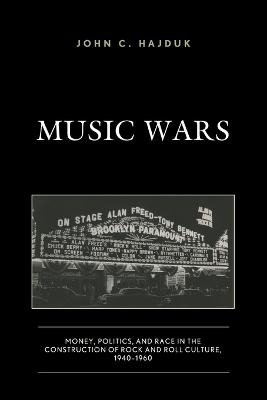
Music Wars
Money, Politics, and Race in the Construction of Rock and Roll Culture, 1940–1960
Seiten
2021
Lexington Books (Verlag)
978-1-4985-7589-8 (ISBN)
Lexington Books (Verlag)
978-1-4985-7589-8 (ISBN)
This study examines the mid-twentieth-century evolution of popular music into a cultural movement in the United States. The author argues that a series of disputes in the music industry led to the assertion of music’s place in promoting core national values.
In the mid-twentieth century, certain elements of the American popular music industry (publishers, recording companies, and broadcasters) began to redefine their product as something more than mere entertainment. This became evident in the arguments made by competing sides in a series of clashes that unfolded during that period, starting with the ASCAP-Radio dispute of 1941 and ending with the payola scandal in 1959. Although these disputes typically revolved around economic issues, in making their cases to the public the respective sides often asserted the significant role played by popular music in promoting core national values. While such rhetoric was basically self-serving, when set against the backdrop of major events like World War II, the Civil Rights Movement, and the Cold War, it resonated strongly with the public and helped convince many that popular music offered more to its audience than momentary diversion. Considering that the resolutions to these conflicts also tended to expand opportunities for previously marginalized styles and performers, notably African-Americans and rural southerners, it became natural to link popular music to ideas of social progress as well. This contributed to the creation of what could be called “rock and roll culture,” a coherent set of values related to concepts of youth, authenticity, sexual liberation, and social equality that emerged by the end of the 1950s. These traits became a prevalent part of American culture through the end of the twentieth century, with popular music seen a perhaps the most significant medium for expressing those values.
In the mid-twentieth century, certain elements of the American popular music industry (publishers, recording companies, and broadcasters) began to redefine their product as something more than mere entertainment. This became evident in the arguments made by competing sides in a series of clashes that unfolded during that period, starting with the ASCAP-Radio dispute of 1941 and ending with the payola scandal in 1959. Although these disputes typically revolved around economic issues, in making their cases to the public the respective sides often asserted the significant role played by popular music in promoting core national values. While such rhetoric was basically self-serving, when set against the backdrop of major events like World War II, the Civil Rights Movement, and the Cold War, it resonated strongly with the public and helped convince many that popular music offered more to its audience than momentary diversion. Considering that the resolutions to these conflicts also tended to expand opportunities for previously marginalized styles and performers, notably African-Americans and rural southerners, it became natural to link popular music to ideas of social progress as well. This contributed to the creation of what could be called “rock and roll culture,” a coherent set of values related to concepts of youth, authenticity, sexual liberation, and social equality that emerged by the end of the 1950s. These traits became a prevalent part of American culture through the end of the twentieth century, with popular music seen a perhaps the most significant medium for expressing those values.
John C. Hajduk is professor of history at the University of Montana Western.
Chapter 1: “The Music Goes Round and Round”: The Music Industry in 1940
Chapter 2: “There’ll Be Some Changes Made”: The ASCAP/Radio Feud
Chapter 3: “Federation Blues”: The American Federation of Musicians’ Battle: Against Canned Music
Chapter 4: “Ballad for Americans”: The Red Scare and the Music Industry
Chapter 5: “Yakety Yak, Don’t Talk Back”: The Battle Against Rock and Roll
Chapter 6: “Your Cash Ain’t Nothin’ But Trash”: The Payola Scandal
Conclusion: “Rock’n Roll Is Here to Stay”
| Erscheinungsdatum | 07.06.2021 |
|---|---|
| Verlagsort | Lanham, MD |
| Sprache | englisch |
| Maße | 153 x 231 mm |
| Gewicht | 327 g |
| Themenwelt | Kunst / Musik / Theater ► Musik ► Klassik / Oper / Musical |
| Geschichte ► Allgemeine Geschichte ► Neuzeit (bis 1918) | |
| ISBN-10 | 1-4985-7589-7 / 1498575897 |
| ISBN-13 | 978-1-4985-7589-8 / 9781498575898 |
| Zustand | Neuware |
| Haben Sie eine Frage zum Produkt? |
Mehr entdecken
aus dem Bereich
aus dem Bereich
Europa 1848/49 und der Kampf für eine neue Welt
Buch | Hardcover (2023)
DVA (Verlag)
CHF 67,20
Giordano Bruno - ein ketzerisches Leben
Buch | Hardcover (2024)
C.H.Beck (Verlag)
CHF 41,85


